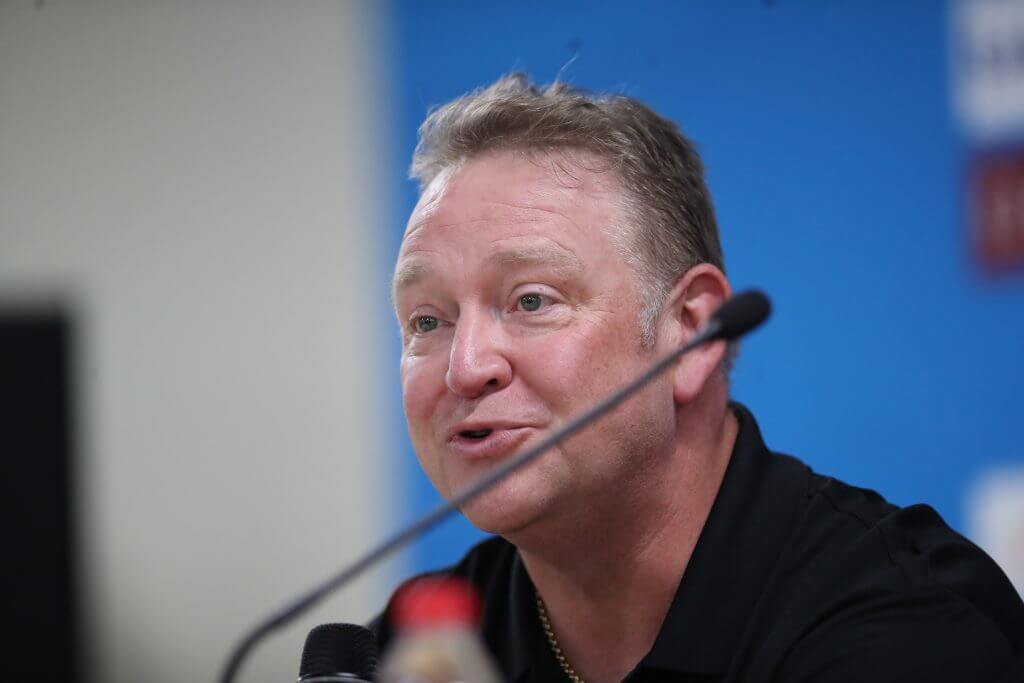John Atkinson Reflects on 10 Seasons in Charge of Swimming Canada

John Atkinson Reflects on 10 Seasons in Charge of Swimming Canada
In his 10 seasons in charge of Swimming Canada, John Atkinson has helped the organization grow from an occasional medal contender to a bona fide powerhouse. He reflected on that journey this week in an interview with the organization.
Atkinson took over a program in 2013 that was searching for direction. The Canadians won three medals (a silver and a bronze in the pool) at the 2012 Olympics in London, one in the 100 free from Brent Hayden, who retired before Games’ end. They’d managed a solitary bronze four years earlier in Beijing, via Ryan Cochrane in the 1,500 free. The nation’s last women’s medal in the Olympics had come in Atlanta in 1996.
Atkinson helped implement a top-to-bottom revitalization of the program, pairing with various nationwide sporting initiatives in the country. Most important was a cultural sea change.
“We talk on our national teams and programs about key words that we use in all that we do with our teams, athletes and staff: Focused, Professional, Calm, Adaptable and No Drama,” Atkinson said. “We also added Resilience during the pandemic as this totally represented how our athletes and staff conducted themselves through the pandemic. We talk about these traits with our teams. I talk about teams travelling and ‘things happen.’ It’s not the things that happen that define a team, but it’s how the team reacts when something happens that is most important. We will continue with this approach on all our teams.”
The results have borne that out. The Canadians won six medals at the 2016 Rio Games, headlined by Penny Oleksiak’s tie for gold in the 100 freestyle. Canada also won relay bronze in the 400 free and 800 free. That number remained at six in Tokyo in 2021, Maggie MacNeil’s gold in the 100 butterfly as the starring attracting.
Atkinson pointed to the 2015 Pan American Games hosted by Toronto as a turning point that “changed perceptions, and the legacy of the Games in Toronto cannot be underestimated.” Canada also won 15 medals and seven golds at the 2017 World Junior Championships in Indianapolis, a blossoming for its women’s program in particular.
Swimming Canada has centralized its training at its two remaining High Performance Centres, in Vancouver and Toronto. It’s expanded its talent identification to younger and younger ages, which Atkinson specifically cites as having an impact on relay depth and success. And it’s done so while maintaining a pipeline of talent from club and college programs in the country
“This performance improvement and culture has been driven from many different perspectives that all contribute to the performance of the team,” Atkinson said. “This includes national programming opportunities with NextGen and National Development Team experience for athletes and their coaches, in the pool and open water, senior camps, centre programming and senior teams.”

- EVENT PAGE
- SCHEDULE
- VENUE
- STREAMING INFO
- DAY 1 PRELIMS RESULTS
- DAY 1 FINALS RESULTS
- DAY 2 PRELIMS RESULTS
- DAY 2 FINALS RESULTS
- DAY 3 PRELIMS RESULTS
- DAY 3 FINALS RESULTS
- DAY 4 PRELIMS RESULTS
- DAY 4 FINALS RESULTS
- DAY 5 PRELIMS RESULTS
- DAY 5 FINALS RESULTS
- DAY 6 PRELIMS RESULTS
- DAY 6 FINALS RESULTS
- DAY 7 PRELIMS RESULTS
- DAY 7 FINALS RESULTS
- DAY 8 PRELIMS RESULTS
- DAY 8 FINALS RESULTS
- DAY 9 FINALS RESULTS




Did you ask why Ben Titley really left?
Great insights John. Congratulations and good luck to your journey in the future!